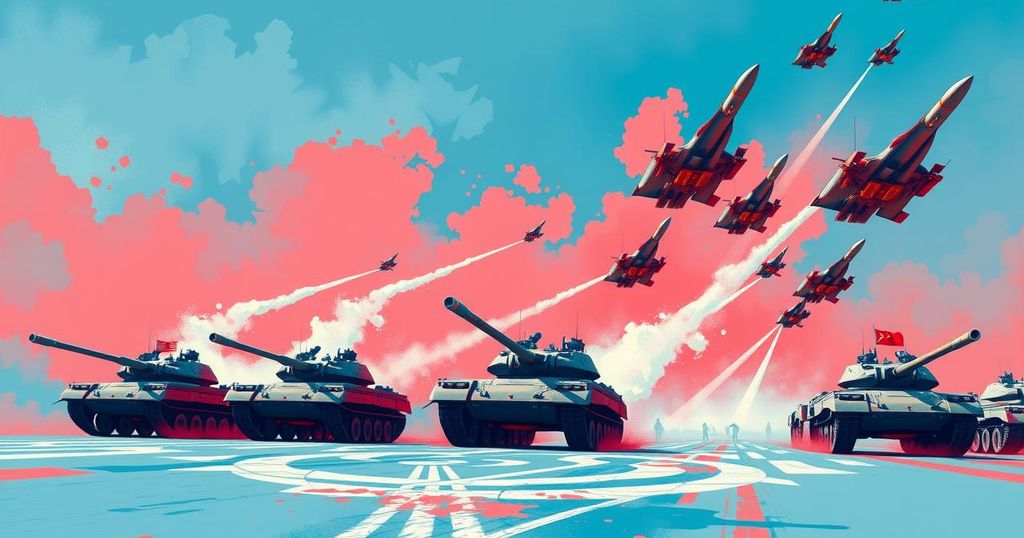The Growing Alliance of Autocrats: A Threat to European Security

A recent gathering in Moscow highlighted an alarming alliance of authoritarian leaders, including Putin and Xi. This coalition poses a significant threat to democracy and European security, with growing military cooperation evident among Russia, China, Iran, and North Korea. Despite these developments, many European leaders remain complacent, neglecting the urgent duty to strengthen defense strategies, leaving Europe vulnerable.
In a disconcerting turn of events, a gathering of autocrats in Moscow showcased a troubling alliance that seems to have eluded the attention of Europe’s leaders. During Russia’s recent World War II commemoration—a somewhat ironic event meant to mark the fall of tyranny—President Vladimir Putin was flanked by prominent figures from various oppressive regimes: Belarus, Venezuela, Cuba, and Zimbabwe among them. Dominating this group was China’s President Xi Jinping, highlighting China’s critical support as Russia intensifies its military campaign in Ukraine.
The optics of these leaders coming together raise alarms, especially when considering the ongoing theme at the London Defence Conference occurring concurrently in the UK. Experts there warned of a growing coalition of dictators, specifically China, Russia, Iran, and North Korea, which they termed the “Crinks.” This alliance, according to their analyses, presents one of the clearest threats to democratic values in the contemporary geopolitical landscape—a notion seemingly lost on many politicians in Europe.
The tangible effects of this autocratic cooperation have not gone unnoticed in Ukraine. Reports reveal that Iranian-made Shahed drones have been deployed in attacks on Ukrainian cities, marking a significant escalation. Moreover, Iranian assistance in constructing a drone factory in Tatarstan, poised to produce up to 6,000 drones annually, further exemplifies how Iran and Russia have deepened their military ties. North Korea’s involvement is no less alarming, as thousands of military supplies have been funneled into Russia, with troop deployments reported on the ground in battles against Ukrainian forces, a situation that should provoke serious concern among Western nations.
While China has refrained from supplying lethal weapons to Russia, its contributions through industrial materials are substantial. Approximately 70% of the machine tools and 90% of essential microchips utilized in Russia’s military rebuilding efforts originate from Chinese sources. Joint military exercises between these two powers have become increasingly common, recently taking place in key maritime areas. China’s financial ties to Russia are profound, with daily purchases of over two million barrels of oil, providing a crucial lifeline for Putin’s regime amidst persistent sanctions.
The implications for European nations are dire. Despite setbacks in Ukraine, Putin remains focused on expanding his military capabilities. NATO’s top general warned that Russia is rearming at an unprecedented rate, seeking to restore and bolster its forces significantly. With plans to produce thousands of military vehicles and munitions this year, the threat level is escalating.
What compounds the complexity of the global landscape is the anxious perception of the United States’ commitment to its allies. Many leaders in Europe seem to be underestimating the severity of the situation. Observers note a disconnect in major European capitals, where leaders like Emmanuel Macron and newly elected Chancellor Friedrich Merz seem unaware of the urgent need for substantial rearmament, while frontline states such as Poland and the Baltic nations instinctively grasp the reality of the threat they face.
The recent assertions by Labour leader Keir Starmer during the London Defence Conference—promoting a meager increase in defense spending—serve as an example of misplaced priorities. Proposed funding increases, while described as critical, do not align with the stark realities of current military demands. With Europe needing to rethink its defense strategies and potentially reorganize alliances in the absence of strong U.S. support, the call for stronger military cooperation among European states is increasingly relevant.
With Britain being Europe’s largest military power, a proactive approach in forming a robust coalition could set a decisive precedent. However, for that to succeed, Europe must refocus on actual defense priorities rather than political posturing, ensuring that it is well-prepared for the challenges presented by a more unified and emboldened array of autocratic regimes. A commitment to defense at levels deemed necessary by experts is essential if Europe is to safeguard its standing against threats.
The gathering of autocrats in Moscow epitomizes the emerging alliance between oppressive regimes that threatens European democratic security. As Russia forges ahead in military ambitions, European leaders appear complacent, underestimating the depth and coordination of this autocratic coalition. Experts urge a reevaluation of Europe’s defense alliances, advocating for renewed commitments and strategies in the face of escalating threats from formidable combinations of adversarial states. The urgency for concerted military collaboration and increased defense investments within Europe cannot be overstated.
Original Source: www.dailymail.co.uk






